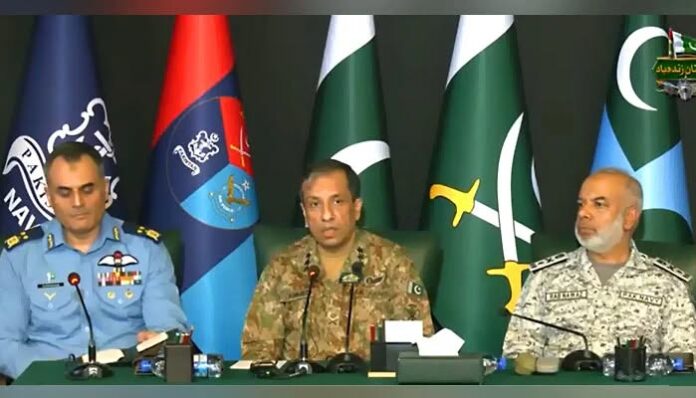India sponsors terrorism in region and Pakistan: DG ISPR.
Says India attacked mosques and martyred 40 civilians.
Pakistan Army committed to defending sovereignty “at all costs”.
Director General of Inter-Services Public Relations (DG ISPR) Lieutenant General Ahmed Sharif Chaudhry, in an interview with a foreign television channel, has said that Pakistan is not a violent nation but a responsible and serious one, with peace as its foremost priority.
Addressing the ongoing regional tensions, the top military spokesperson said that the roots of the current standoff lie in India’s consistent policy of sponsoring and abetting terrorism, particularly within Pakistan.
He added that instead of acknowledging Islamabad’s role and working towards a resolution, New Delhi was hiding behind a false narrative of blaming Pakistan for acts of terrorism.
Referring specifically to the Pahalgam incident, the DG ISPR criticised India’s response, questioning how fingers were pointed at Pakistan within minutes of the attack. “Within 10 minutes, the first investigation report is registered in which it is established that the attackers came from across the border.”
Lt Gen Chaudhry also said that when India’s Foreign Ministry spokesperson was asked about the progress of the investigation, he even admitted that it was still ongoing.
The army’s spox emphasised that Pakistan has taken a clear and transparent stance, saying that if India has any evidence linking the attack to Pakistan, it should be presented to a neutral and credible international body. Pakistan, he said, remains ready to cooperate fully.
“Not opting to go for that very rational approach, unilaterally, the Indians decided and they attacked mosques, they bombed mosques, with their missiles, they killed children, women, elderly. There are 40 shaheeds, 40 civilian shaheeds, 22 of them are women and children,” he said.
The DG ISPR condemned India’s behaviour as acting unilaterally as “judge, jury and executioner”.
He further highlighted that India is the principal sponsor of terrorism in Pakistan, citing its involvement in fuelling extremist elements such as Fitna al-Khawarij and supporting terrorist networks in Balochistan.
He reaffirmed the Pakistan Armed Forces’ commitment to defending the country’s sovereignty. “The task that has been entrusted to the Pakistan Armed Forces by the people and the state is to defend its territory, integrity and sovereignty.”
“This is that honourable task that has been entrusted to us, and we will defend it at all costs,” he asserted.
To that end, last week, Pakistan’s armed forces launched a large-scale retaliatory military action, named “Operation Bunyan-um-Marsoos”, and targeted several Indian military targets across multiple regions.
The strikes, described by officials as “precise and proportionate”, were carried out in response to India’s continued aggression across the Line of Control (LoC) and within Pakistan’s territory, which New Delhi claimed were aimed at “terrorist targets”.
Pakistan downed India’s six fighter jets, including three Rafale, and dozens of drones. After at least 87 hours, the war between the two nuclear-armed nations ended on May 10 with a ceasefire agreement brokered by the United States.
According to the ISPR, a total of 53 people, including 13 personnel of the armed forces and 40 civilians, were martyred in Indian strikes during the recent military confrontation.
The military confrontation between the two countries was triggered by last month’s attack in Indian Illegally Occupied Jammu and Kashmir (IIOJK) that left 26 tourists dead, with India blaming Pakistan for the attack without offering any evidence.

